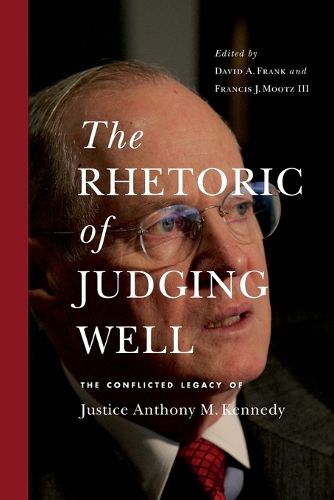Readings Newsletter
Become a Readings Member to make your shopping experience even easier.
Sign in or sign up for free!






This title is printed to order. This book may have been self-published. If so, we cannot guarantee the quality of the content. In the main most books will have gone through the editing process however some may not. We therefore suggest that you be aware of this before ordering this book. If in doubt check either the author or publisher’s details as we are unable to accept any returns unless they are faulty. Please contact us if you have any questions.
Known as the "swing justice," Justice Anthony M. Kennedy provided the key vote determining which way the Supreme Court would decide on some of the most controversial cases in US history. Though criticized for his unpredictable rulings, Kennedy also gained a reputation for his opinion writing and, more so, for his legal rhetoric.
This book examines Justice Kennedy's legacy through the lenses of rhetoric, linguistics, and constitutional law. Essays analyze Kennedy's opinion writing in landmark cases such as Romer v. Evans, Obergefell v. Hodges, and Planned Parenthood v. Casey. Using the Justice's rhetoric as an entry point into his legal philosophy, this volume reveals Kennedy as a justice with contradictions and blind spots-especially on race, women's rights, and immigration-but also as a man of empathy deeply committed to American citizenship.
A sophisticated assessment of Justice Kennedy's jurisprudence, this book provides new insight into Kennedy's legacy on the Court and into the role that rhetoric plays in judging and in communicating judgment.
In addition to the editors, the contributors to this volume are Ashutosh Bhagwat, Elizabeth C. Britt, Martin Camper, Michael Gagarin, James A. Gardner, Eugene Garver, Leslie Gielow Jacobs, Sean Patrick O'Rourke, Susan E. Provenzano, Clarke Rountree, Leticia M. Saucedo, Darien Shanske, Kathryn Stanchi, and Rebecca E. Zietlow.
$9.00 standard shipping within Australia
FREE standard shipping within Australia for orders over $100.00
Express & International shipping calculated at checkout
This title is printed to order. This book may have been self-published. If so, we cannot guarantee the quality of the content. In the main most books will have gone through the editing process however some may not. We therefore suggest that you be aware of this before ordering this book. If in doubt check either the author or publisher’s details as we are unable to accept any returns unless they are faulty. Please contact us if you have any questions.
Known as the "swing justice," Justice Anthony M. Kennedy provided the key vote determining which way the Supreme Court would decide on some of the most controversial cases in US history. Though criticized for his unpredictable rulings, Kennedy also gained a reputation for his opinion writing and, more so, for his legal rhetoric.
This book examines Justice Kennedy's legacy through the lenses of rhetoric, linguistics, and constitutional law. Essays analyze Kennedy's opinion writing in landmark cases such as Romer v. Evans, Obergefell v. Hodges, and Planned Parenthood v. Casey. Using the Justice's rhetoric as an entry point into his legal philosophy, this volume reveals Kennedy as a justice with contradictions and blind spots-especially on race, women's rights, and immigration-but also as a man of empathy deeply committed to American citizenship.
A sophisticated assessment of Justice Kennedy's jurisprudence, this book provides new insight into Kennedy's legacy on the Court and into the role that rhetoric plays in judging and in communicating judgment.
In addition to the editors, the contributors to this volume are Ashutosh Bhagwat, Elizabeth C. Britt, Martin Camper, Michael Gagarin, James A. Gardner, Eugene Garver, Leslie Gielow Jacobs, Sean Patrick O'Rourke, Susan E. Provenzano, Clarke Rountree, Leticia M. Saucedo, Darien Shanske, Kathryn Stanchi, and Rebecca E. Zietlow.